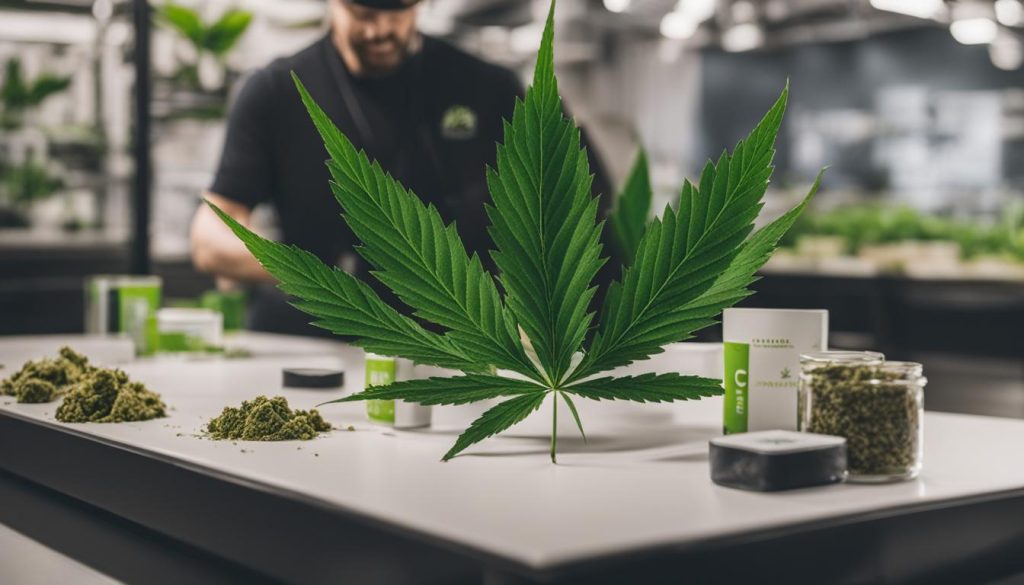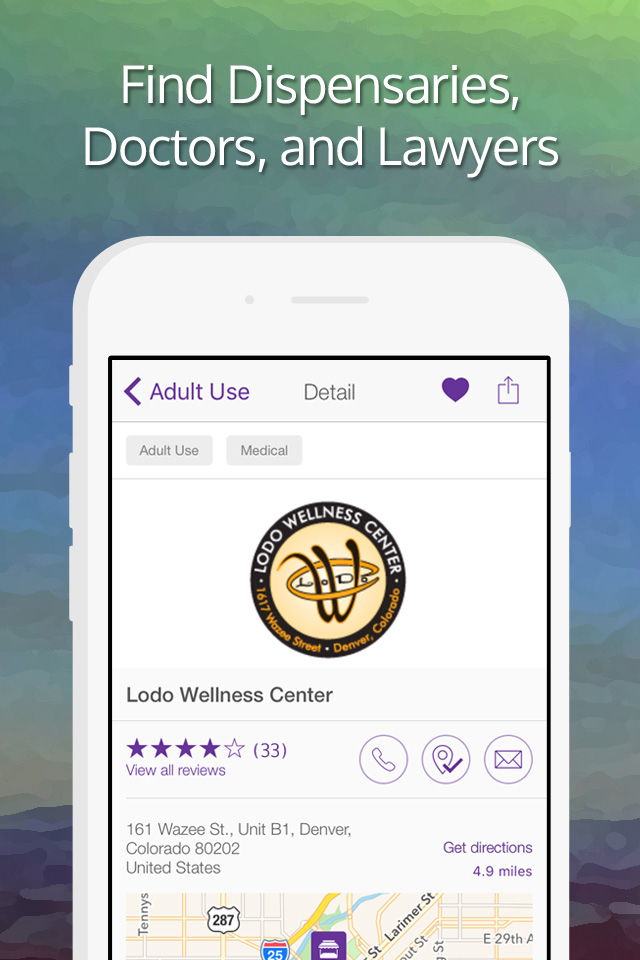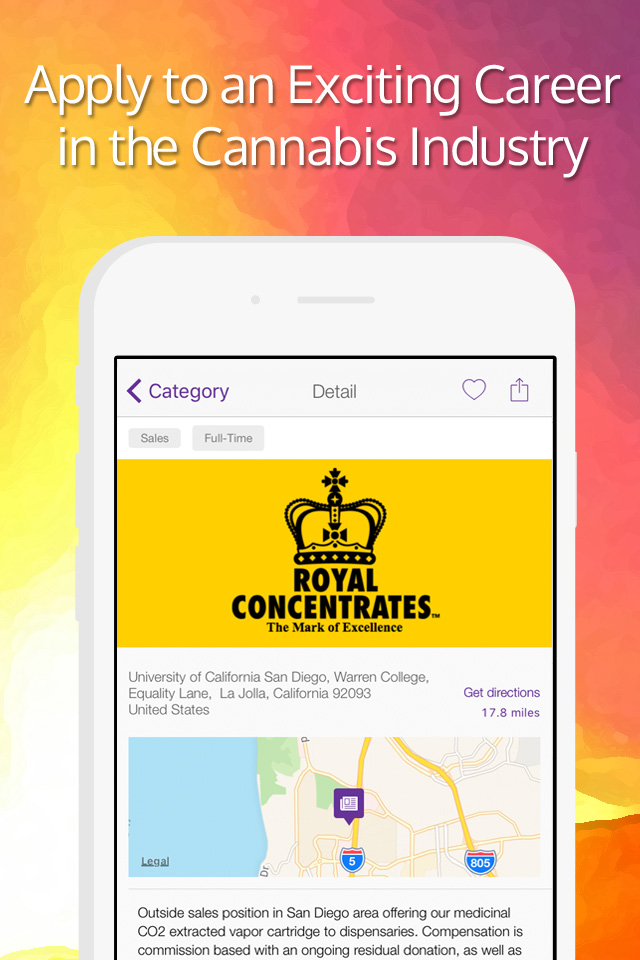
Advancing Your Career in the Cannabis Industry
The cannabis industry is experiencing rapid growth and evolution, providing abundant opportunities for professionals seeking to advance their careers. As the industry continues to thrive, it is essential for individuals to develop their skills and stay ahead of emerging trends in order to achieve long-term success.
At [Company Name], we understand the importance of professional development in the cannabis sector. Our team of industry experts is dedicated to helping professionals navigate the dynamic landscape and unlock their full potential within the industry.
Key Takeaways:
- Career growth in the cannabis industry is attainable through continuous professional development.
- Staying ahead of industry trends is crucial for advancing in cannabis careers.
- Investing in skills development can lead to upward mobility within the industry.
- The cannabis industry offers numerous opportunities for professionals seeking advancement.
- At [Company Name], we are committed to supporting your journey in advancing your career in the cannabis industry.
The Importance of Skills Development in the Cannabis Industry
The cannabis industry is constantly evolving and experiencing significant growth. As the market expands, it becomes crucial for professionals to prioritize skills development in order to stay competitive and advance their careers. Quality work is highly valued in the cannabis industry, as it directly impacts customer satisfaction. By continuously developing and honing their skills, professionals can ensure they are delivering the highest level of service and product quality.
With new products, technologies, and regulations emerging regularly, staying ahead of industry trends is essential. Professionals who invest in skills development are better equipped to navigate the ever-changing landscape of the cannabis industry. Whether it’s mastering the latest cultivation techniques, understanding new extraction methods, or staying informed about compliance requirements, honing one’s skills is vital to success.
Advancing in the cannabis industry often requires specialized knowledge and expertise. By actively pursuing skills development, professionals can position themselves as industry experts and increase their chances of career advancement. Whether it’s through formal education programs, industry certifications, or hands-on training, acquiring new skills not only enhances one’s professional capabilities but also opens doors to new opportunities within the cannabis industry.
| Benefits of Skills Development in the Cannabis Industry |
|---|
| 1. Increased job prospects and career advancement opportunities |
| 2. Enhanced ability to adapt to industry changes and advancements |
| 3. Higher quality work leading to customer satisfaction |
| 4. Positioning oneself as an industry expert |
| 5. Opening doors to new opportunities within the cannabis industry |
Investing time and effort into skills development not only benefits individuals but also contributes to the overall growth and success of the cannabis industry. As professionals continue to enhance their abilities and knowledge, the industry as a whole becomes more reputable, attracting more customers and investors. By prioritizing skills development, professionals can make a significant impact on both their personal careers and the industry as a whole.
The Training Gap in the Cannabis Industry
Despite the rapid growth of the cannabis industry, there is a significant gap in education and training. Many professionals have not received formal training, and traditional educational institutions have struggled to keep up with the industry’s rapid changes. This has led to a skills shortage and a need for reliable sources of knowledge.
Online resources, such as Vangst Learn, play a crucial role in providing specialized cannabis training. These platforms offer a wide range of courses and modules that cover various aspects of the industry, including cultivation techniques, compliance and regulations, product knowledge, and sales and marketing strategies.
By utilizing online resources, professionals can bridge the education gap and acquire the necessary skills to excel in the cannabis industry. These platforms offer flexibility and accessibility, allowing individuals to learn at their own pace and tailor their learning experience to their specific needs and interests. Online training also provides the opportunity for professionals to stay updated with the latest industry trends and advancements in real-time.
Table: Benefits of Online Cannabis Training
| Benefits | Description |
|---|---|
| Convenience | Access courses anytime, anywhere, and learn at your own pace. |
| Specialized Knowledge | Explore specific areas of the cannabis industry that interest you and gain expertise. |
| Cost-effective | Compared to traditional education, online training is often more affordable. |
| Industry Connections | Connect with industry professionals and broaden your network through online communities. |
| Real-time Updates | Stay informed about the latest industry trends and regulatory changes. |
Investing in online cannabis training not only enhances your knowledge and skills but also demonstrates your commitment to professional development. It can give you a competitive edge in the job market and open up new opportunities for career advancement within the cannabis industry.
Transferable Skills for the Cannabis Industry
As the cannabis industry continues to grow, professionals from various backgrounds are finding opportunities to thrive in this highly regulated and rapidly evolving field. Many skills acquired in other industries can be effectively transferred to the cannabis sector, making professionals with diverse experiences valuable assets. Whether it’s experience in highly regulated industries, startup environments, sales and marketing expertise, or finance and accounting proficiency, these transferable skills can play a crucial role in advancing careers in the cannabis industry.
Highly Regulated Industries
Professionals with experience in highly regulated industries, such as pharmaceuticals or banking, possess valuable knowledge of navigating complex regulations. The cannabis industry is heavily regulated, with strict compliance requirements and evolving laws. Professionals who have worked in industries with similar regulatory challenges can bring their expertise to the cannabis sector, ensuring compliance and mitigating risks.
Startup Experience
The cannabis industry is known for its rapid growth and innovation. Professionals with startup experience thrive in this dynamic environment, as they are accustomed to adapting quickly to change and tackling new challenges. Startups often require employees to wear multiple hats and take on diverse responsibilities. This versatility is highly valued in the cannabis industry, where roles may not always be clearly defined, especially in smaller-scale companies.
Sales and Marketing Skills
Sales and marketing skills are essential for success in the cannabis industry. Professionals with a background in sales and marketing can leverage their expertise to stimulate product demand and generate revenue. With restrictions on advertising and marketing in the cannabis sector, creative strategies and an understanding of industry-specific marketing channels are essential for reaching target audiences effectively.
Finance and Accounting Expertise
The cannabis industry faces unique financial challenges, such as limited access to banking services and cash flow management. Professionals with finance and accounting expertise can help cannabis companies navigate these challenges by implementing effective financial systems, ensuring compliance with financial regulations, and optimizing cash flow. Their ability to manage financial resources and provide strategic financial guidance is highly valued in this industry.
| Transferable Skills | Relevance to Cannabis Industry |
|---|---|
| Experience in highly regulated industries | Knowledge of navigating complex regulations and ensuring compliance |
| Startup experience | Adaptability to a rapidly changing industry and versatility in roles |
| Sales and marketing skills | Ability to stimulate product demand and generate revenue within advertising restrictions |
| Finance and accounting expertise | Management of financial challenges and optimization of cash flow |
Overcoming Challenges in Skills Transfer
In the cannabis industry, transferring skills from other industries can present unique challenges. One of the main obstacles is the prevalence of small-scale cannabis companies. Unlike larger corporations with strictly defined job roles, smaller cannabis companies often require professionals to be versatile and take on multiple responsibilities. This job role versatility can make it challenging for individuals to transfer their skills effectively and find a specific niche within the industry.
Furthermore, professionals in finance and marketing may encounter specific challenges when transitioning to the cannabis industry. Finance professionals, for example, must navigate the industry’s banking limitations. Due to cannabis’s federal classification as a Schedule I substance, many financial institutions are hesitant to provide services to cannabis companies. This can create complex financial management and cash flow challenges that finance professionals need to address.
On the other hand, marketers in the cannabis industry must navigate strict advertising regulations. Cannabis products often face restrictions on how they can be promoted, making it crucial for marketers to find creative ways to generate brand awareness and stimulate product demand within the boundaries of compliance. These challenges can require a different approach to marketing than what professionals may be accustomed to in other industries.
Additionally, acquiring knowledge about cannabis and its effects is essential when transitioning to the industry. Given the relative youth of the cannabis industry, there is still much to learn. Professionals must familiarize themselves with the unique characteristics of cannabis and stay up-to-date with the latest research, regulations, and consumer trends. This knowledge acquisition process can be time-consuming, but it is crucial for success in the industry.
Table: Challenges in Skills Transfer
| Challenges | Impact |
|---|---|
| Job Role Versatility | Difficulty finding a specific niche and utilizing individual skills effectively |
| Finance Challenges | Banking limitations create complex financial management and cash flow obstacles |
| Marketing Challenges | Strict advertising regulations require creative approaches to brand awareness and product demand generation |
| Acquiring Knowledge | Continuous learning required due to the relative youth of the industry |
Innovative Recruiting Strategies in the Cannabis Industry
Recruiting top talent in the fast-growing cannabis industry can be challenging. With increased competition and evolving regulations, cannabis companies are embracing innovative strategies to attract and retain skilled professionals. In this section, we explore some of the creative recruitment strategies that are being implemented in the cannabis industry.
Staffing Agencies: Finding the Right Fit
Cannabis companies are increasingly partnering with staffing agencies specializing in the industry. These agencies have deep networks and expertise in sourcing candidates with the specific skill sets required for various roles in the cannabis sector. By relying on their expertise, companies can save time and resources in the hiring process, ensuring they find the right fit for their organization.
Competitive Salaries and Benefit Packages
To entice professionals from traditional industries, cannabis companies are offering competitive salaries and attractive benefit packages. By offering compensation that matches or exceeds what professionals can earn in other fields, cannabis companies are able to attract top talent. Additionally, comprehensive benefit packages, including healthcare coverage and retirement plans, provide added incentives for candidates to choose a career in the cannabis industry.
Creative Recruitment Strategies
Cannabis companies are thinking outside the box when it comes to recruiting talent. Some companies organize budtender competitions, where aspiring budtenders can showcase their product knowledge, customer service skills, and ability to work in a fast-paced environment. These competitions not only attract passionate individuals but also provide companies with an opportunity to assess candidates’ skills and abilities in a competitive setting.
Other companies host cannabis cook-offs, inviting aspiring chefs to demonstrate their culinary skills using cannabis-infused ingredients. These events not only highlight the versatility of cannabis in the culinary world but also allow companies to identify talented individuals who can contribute to product development and edibles manufacturing.
Overall, the cannabis industry is finding new and creative ways to recruit professionals from various backgrounds. By leveraging staffing agencies, offering competitive compensation packages, and implementing unique recruitment strategies, cannabis companies are ensuring they have access to the best talent and driving the industry forward.

| Recruitment Strategies | Benefits |
|---|---|
| Partnering with staffing agencies | – Expertise in sourcing specialized candidates – Time and resource savings in the hiring process |
| Offering competitive salaries and benefit packages | – Attracting top talent from other industries – Providing incentives for career growth and job security |
| Organizing budtender competitions | – Assessing candidates’ product knowledge and customer service skills – Identifying passionate individuals with potential |
| Hosting cannabis cook-offs | – Identifying talented individuals for product development and edibles manufacturing – Showcasing the versatility of cannabis |
The Importance of Language in the Cannabis Industry
The cannabis industry is a rapidly growing and evolving field that requires professionals to communicate in a clear, professional, and compliant manner. The use of appropriate language is crucial for establishing credibility, avoiding stigma, and maintaining compliance with regulations.
Using professional language in the cannabis industry is essential for establishing credibility and professionalism. It helps to create a positive image of the industry and its professionals, dispelling misconceptions and reducing stigma. By using precise and accurate terminology, professionals can showcase their knowledge and expertise, gaining the trust of clients, colleagues, and regulators.
Compliance is a central aspect of the cannabis industry, with strict regulations governing its operation. Using the correct language ensures that professionals adhere to these regulations and demonstrate their understanding of the industry’s legal requirements. It also helps to avoid miscommunication and potential legal issues, providing protection for both professionals and businesses.
Clarity is another important aspect of language in the cannabis industry. In a field that is constantly evolving and subject to frequent changes in products, regulations, and technologies, clear communication is crucial. Using precise terminology helps to avoid misunderstandings and ensures that everyone involved has a shared understanding of the subject matter. This promotes efficiency and effectiveness in day-to-day operations, leading to improved outcomes for businesses and their customers.
In summary, the use of professional language in the cannabis industry is vital for maintaining compliance, establishing credibility, and promoting clear communication. By using appropriate terminology, professionals can showcase their expertise, build trust, and contribute to the growth and legitimacy of the industry as a whole.

Using the Right Terminology in Resumes and Interviews
When applying for a job or attending an interview in the cannabis industry, it is crucial to use the correct terminology to showcase professionalism, compliance, and credibility. Your choice of words not only demonstrates your understanding of the industry but also helps you avoid any potential stigma associated with cannabis.
Using precise and accurate language in your resumes and interviews ensures clarity in communication and helps break down any misconceptions or stereotypes. It also gives you a competitive edge, as it showcases your industry knowledge and commitment to professionalism.
For example, instead of using terms like “marijuana,” which carries a historical stigma, opt for the term “cannabis.” This shows respect for the global perspective of the industry and aligns with the preferred terminology in the field. In addition, when referring to retail establishments, use terms like “dispensary” or “compassion center” to reflect professionalism, rather than using phrases like “pot shop” or “weed store.”
Furthermore, it is essential to highlight your knowledge of compliance and regulations in the industry. Using terms like “compliance” and emphasizing your understanding of the legal framework demonstrates your commitment to abiding by industry standards. Additionally, if you have experience in plant care and cultivation, using the term “cultivation” in your resume or interview discussions showcases your expertise in that specific field.
The Benefits of Using Appropriate Language
Using the right terminology not only enhances communication with potential employers but also helps establish a professional image. It showcases that you understand the importance of compliance and are committed to upholding industry standards. Using accurate and precise language in your resumes and interviews demonstrates your credibility as a candidate.
Moreover, by using language that avoids stigma and stereotypes, you contribute to breaking down barriers associated with the cannabis industry. This not only makes the industry more accessible and accepted but also presents it as a legitimate and regulated field.
Ultimately, using the right terminology in your resumes and interviews helps you stand out from other candidates. It shows your professionalism, compliance with regulations, and dedication to the cannabis industry. By using appropriate language, you position yourself as a knowledgeable and forward-thinking professional, ready to contribute to the growth and success of the cannabis industry.
| Benefits of Using Appropriate Language | Keywords |
|---|---|
| Enhanced communication | Professionalism, clarity |
| Establishment of a professional image | Credibility, professionalism |
| Legal protection | Compliance |
| Demonstration of industry knowledge | Credibility, compliance |
Appropriate Terms and Guidance for Resumes and Interviews
In the cannabis industry, using appropriate terminology and language in resumes and interviews is crucial for showcasing professionalism, compliance, and industry knowledge. It is essential to use the right terms to reflect a thorough understanding of the industry and to avoid stigmatizing or misrepresenting cannabis-related roles.
When creating resumes, it is important to replace terms like “marijuana” with “cannabis.” While some may view “marijuana” as a commonly used term, “cannabis” is now preferred due to its global and scientific perspective. This change demonstrates respect and understanding of the industry’s evolving practices and terminology.
Additionally, it is crucial to use appropriate language when referring to businesses within the cannabis industry. Instead of terms like “pot shop” or “weed store,” use “dispensary” or “compassion center” to convey professionalism and legitimacy. These terms are widely recognized and indicate a commitment to compliance with industry regulations.
When discussing roles involving plant care, use the term “cultivation” instead of generic terms like “gardening” or “farming.” “Cultivation” emphasizes the specific skills required for cannabis production and clearly communicates industry expertise.
Furthermore, highlighting knowledge of regulatory compliance is critical for many positions in the cannabis industry. Including the term “compliance” in resumes and interviews shows an understanding of the importance of adhering to legal guidelines and regulations within the industry.
Lastly, when referring to individuals with experience in the underground cannabis market, it is appropriate to use the term “legacy operator” instead of “black market.” “Legacy operator” acknowledges their expertise and contributions to the cannabis community while reinforcing the industry’s move towards regulation and legitimacy.
Incorporating these appropriate terms and guidance in resumes and interviews not only showcases professionalism and compliance but also communicates industry knowledge and respect for the rapidly evolving cannabis industry.
Benefits of Using Appropriate Language in the Cannabis Industry
Using the right language in the cannabis industry brings numerous benefits that contribute to enhanced communication, a professional image, legal protection, and industry knowledge. By utilizing precise and accurate terminology, professionals in the cannabis industry can effectively convey their ideas, needs, and expectations to colleagues, regulators, and clients.
One of the primary advantages of using appropriate language is the improvement in communication. Clear and precise terminology ensures that everyone involved in the conversation understands the intended message, reducing the risk of misunderstandings or misinterpretations. This level of clarity fosters productive discussions and promotes collaboration among team members.
Moreover, using the right language helps establish a professional image. By adhering to industry-specific terms and avoiding slang or informal language, professionals present themselves as knowledgeable and credible individuals. This professionalism builds trust with clients, regulators, and business partners, which can open up new opportunities for growth and collaboration.
Legal protection is another critical benefit of using appropriate language in the cannabis industry. Due to the complex and evolving regulatory landscape, compliance is of utmost importance. By accurately using terminology that aligns with industry regulations, professionals can demonstrate their commitment to legal compliance and reduce the risk of regulatory violations.
Lastly, using the right language in the cannabis industry promotes industry knowledge and keeps professionals up-to-date with the latest trends and developments. By staying informed and using the appropriate terminology, professionals can showcase their expertise and position themselves as industry leaders. This continuous pursuit of industry knowledge not only enhances professional growth but also contributes to the overall advancement of the cannabis industry as a whole.
| Benefits of Using Appropriate Language in the Cannabis Industry |
|---|
| Enhanced communication |
| Professional image |
| Legal protection |
| Industry knowledge |

Conclusion
In the rapidly growing cannabis industry, advancing in cannabis careers requires a commitment to continuous skills development and staying ahead of industry trends. With numerous opportunities for professional growth and advancement, it is essential to invest in professional development to thrive in this exciting and evolving field.
By focusing on career growth and acquiring new skills, professionals can position themselves as leaders in the cannabis industry. Whether it’s staying updated on the latest regulations, honing specialized knowledge, or developing transferable skills, investing in professional development is key to advancing in cannabis careers.
Professional development not only enhances individual capabilities but also contributes to the overall growth of the industry. As we strive for excellence, embracing continuous learning and skills development allows us to collectively elevate the standards of the cannabis industry and provide a higher level of service and expertise to our clients.
So, let’s seize the opportunities available to us. Let’s continue to learn, adapt, and grow. By investing in our professional development, we can pave the way for a successful and fulfilling career in the cannabis industry and contribute to its ongoing advancement.
FAQ
What are some transferable skills for the cannabis industry?
Experience in highly regulated industries, such as pharmaceuticals and banking, as well as startup experience, sales and marketing skills, and finance and accounting expertise.
What challenges may arise when transferring skills to the cannabis industry?
The unique characteristics of the industry, such as small-scale companies with versatile job roles, banking limitations, restrictive advertising regulations, and the need for knowledge about cannabis and its effects.
How can cannabis companies attract talent from other industries?
Some strategies include partnering with staffing agencies, offering competitive salaries and benefit packages, and implementing creative recruitment strategies such as budtender competitions or cannabis cook-offs.
Why is using appropriate language important in the cannabis industry?
It is crucial for professionalism, compliance, and credibility. Precise terminology ensures clear communication, helps break down stigmas associated with cannabis, and presents the industry as legitimate and regulated.
What terminology should be used in resumes and interviews for the cannabis industry?
Using the term “cannabis” instead of “marijuana” shows respect and a global perspective. “Dispensary” or “Compassion Center” should be used instead of “pot shop” or “weed store” to reflect professionalism. “Cultivation” should be used to describe roles in plant care, and “compliance” highlights knowledge of regulations. “Legacy Operator” should be used instead of “black market” to acknowledge the cannabis community’s expertise.
What are the benefits of using appropriate language in the cannabis industry?
It enhances communication with colleagues, regulators, and clients, maintains a professional image, offers legal protection by ensuring compliance, demonstrates industry knowledge, and keeps professionals up-to-date with industry trends.








